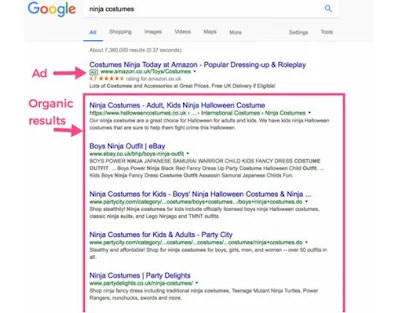What Is SEO?
What is SEO and how does it work?
Search Engine Optimization, often abbreviated as SEO, is
the art of enhancing websites, web pages, and content with the goal of
achieving higher rankings on popular search engines such as Google. SEO
encompasses a range of techniques aimed at improving the visibility,
positioning, and overall quality of various content types within organic search
results. These content types may encompass web pages, multimedia like videos
and images, local business listings, and other valuable assets. Given that
organic search remains the primary means through which people discover and
access online information, embracing SEO best practices becomes crucial to
ensure that your digital content can be easily found and selected by the
public, ultimately boosting your website's organic traffic.
For instance, suppose there's a page already indexed by Google on Patagonia.com,
focusing on used clothing. This page contains internal links leading to
additional sections of the website dedicated to used jackets, used hiking
boots, and used flannel shirts. Google's crawlers can follow these links to
access and evaluate these associated pages. Concurrently, if Patagonia's
primary used clothing page links to an article hosted on TheGuardian.com
discussing the adverse effects of fast fashion, Google can follow that link as
well, thereby discovering and potentially adding the content to its index.
The content found on the explored page and the context of the links that the
crawler followed from Patagonia to The Guardian are crucial in assisting Google
in comprehending the page's subject matter and its relevance to the broader
array of pages within its index.
If you happen to be the journalist responsible for the Guardian article addressing the issue of fast fashion, the fact that a prominent brand's used outdoor clothing section is referencing your work indicates to Google that there may exist a connection between the challenges associated with fast fashion and the potential solution of opting for pre-owned clothing instead of new items. These semantic connections play a pivotal role in assisting Google in determining which search results to display in response to user queries.
The success of search engines as businesses hinges on their ability to deliver search results that align with the needs of the public. When a search engine like Google identifies an increasing number of links from a specific content type pointing towards a particular resource, it gains confidence that the linked resource is relevant to certain search queries. Consequently, the search engine assigns a higher ranking to this resource when people make those specific queries.
In the realm of SEO (Search Engine Optimization), there are three primary categories to consider: on-page SEO, off-page SEO, and technical SEO. Each of these components collaboratively contributes to helping search engines locate, crawl, index, comprehend, and rank your content. In this article, we will delve into each of these aspects in detail.
Why is SEO important?
One of the key factors underscoring the importance of SEO is its ability to enable online publishers to feature prominently in the search engine results pages. Both Google and Bing, for instance, employ distinct algorithms to highlight and present content when users input queries into their search boxes, as illustrated below:
When faced with a query such as this one, Google, as a search engine, has the capacity to yield a diverse array of results. Let's delve into and categorize some of the various result types:
- Classic Organic Results
The most familiar outcomes delivered by Google are the classic organic results. These comprise links to webpages that are ranked in a specific order, determined by Google's intricate algorithms. Search engine algorithms are essentially a set of mathematical formulas utilized by the search engine to assess the relevance of potential results to a user's query. In the past, Google typically presented a page containing 10 organic results for each query. However, this number can now vary considerably, depending on whether the searcher is using a desktop computer, mobile phone, or another device. Classic organic results typically feature a title, description, source link, and may include additional elements like dates and supplementary links:




